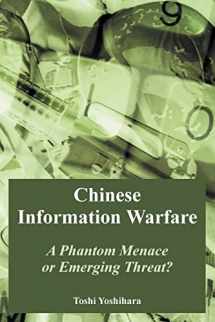
Chinese Information Warfare: A Phantom Menace or Emerging Threat?
ISBN-13:
9781410217967
ISBN-10:
1410217965
Author:
Toshi Yoshihara
Publication date:
2004
Publisher:
University Press of the Pacific
Format:
Paperback
52 pages
FREE US shipping
Book details
ISBN-13:
9781410217967
ISBN-10:
1410217965
Author:
Toshi Yoshihara
Publication date:
2004
Publisher:
University Press of the Pacific
Format:
Paperback
52 pages
Summary
Chinese Information Warfare: A Phantom Menace or Emerging Threat? (ISBN-13: 9781410217967 and ISBN-10: 1410217965), written by authors
Toshi Yoshihara, was published by University Press of the Pacific in 2004.
With an overall rating of 4.3 stars, it's a notable title among other
books. You can easily purchase or rent Chinese Information Warfare: A Phantom Menace or Emerging Threat? (Paperback) from BooksRun,
along with many other new and used
books
and textbooks.
And, if you're looking to sell your copy, our current buyback offer is $0.3.
Description
Mao Tse-tung counseled, "To achieve victory we must as far as possible make the enemy blind and deaf by sealing his eyes and ears, and drive his commanders to distraction by creating confusion in their minds." Few concepts mesh so contextually with Mao than the Chinese approach to Information Warfare (IW). As the People's Republic of China struggles with its national military strategy, IW offers opportunities to win wars without the traditional clash of arms. In this monograph, Mr. Toshi Yoshihara explores what he perceives to be China's pursuit of IW as a method of fighting asymmetric warfare against the United States. Largely imitative of U.S. thoughts, literature, and practices on IW, he believes the Chinese are seeking ways to adapt it to their own style of warfare. Paradoxically, he observes that the Chinese have not gleaned their intelligence through espionage, but through careful scrutiny of U.S. IW in practice. The Persian Gulf War and Kosovo conflict have provided ample largess to the Chinese archives. Mr. Yoshihara examines those aspects of IW-PSYOPS, Denial, and Deception-that China believes provides the greatest prospects for victory in a conflict. Not surprisingly, Sun Tzu is interwoven into this emerging theory. Targeting the enemy's "nervous system" at all levels, that is, his ability to gather and assess information and then transmit orders, provides significant advantages in the prosecution of a campaign. Targeting the enemy's homeland defenses and its citizens can potentially end a war before it even starts. He concludes that the extent of Chinese advances or intent regarding IW is difficult to ascertain given its closed society. Chinese IW may still be nascent, but the menacing intent is there and only vigilance will protect the United States. Much in the realm of IW remains speculative and conceptual. Aspiring nations can take advantage of the Revolution in Military Affairs by skipping generations of technology and becoming a modern, sophisticated threat, obviating the need for significant financial investments. The consequences of the threat are of great import to today's strategic leaders and thinkers. The Strategic Studies Institute is pleased to offer this monograph as a topic of debate that will continue into the millennium. Douglas C. Lovelace, Jr. Director, Strategic Studies Institute


We would LOVE it if you could help us and other readers by reviewing the book
Book review

Congratulations! We have received your book review.
{user}
{createdAt}
by {truncated_author}


